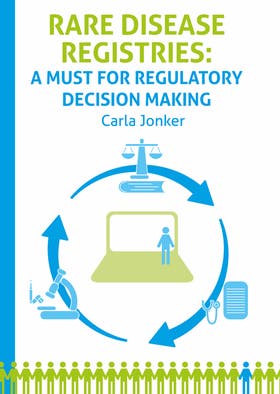Carla Jonker
Rare disease registries: A must for regulatory decision making

- Datum
- (Co) promotoren
- 15-02-2022
Samenvatting
The aim for this thesis is to investigate the value of registries for regulatory decision-making in rare diseases. In the first study we present the results of a review of 116 new medicinal products approved in the European Union between 2007 and 2010. For 43 (37%) medicinal products a total of 73 registries were identified. Of these 46 were disease registries and 27 (single) drug registries. The primary goal of the registry was to collect further safety data (39 registries) or data on the use of a medicinal product during pregnancy (27 registries). The study showed that registries are an important and frequently used tool for post‐approval data collection for orphan and innovative drugs. In a follow-up study we reviewed the protocols and the follow-up reports for these 73 registry studies. Two studies (3%) in registries had been finalized, 19 registries (26%) had not enrolled any patients, and 52 studies (71%) were ongoing. Data from 11 registry studies were published in peer-reviewed journals. Results of six registries were mentioned in European Public Assessment Report updates only, and for two medicinal products the results were added to the label. This illustrates that so far registries only have a limited impact on resolving gaps in the knowledge of a drug’s benefits and risks at time of marketing authorisation. In the third study we investigated the extent to which clinical single-arm trials and the PedNet registry did collect the set of core data as described in the “Guideline clinical investigation on the of recombinant and human plasma-derived factor VIII products”. The presented analysis demonstrated that the clinical trials were highly diverse, especially in number of patients, severity definition, follow-up period and inhibitor test modalities. It exemplarily demonstrated that the PedNet registry collected data as required by the guideline. The results of inhibitor development were comparable, especially when focusing on patients with severe haemophilia. In the next study we investigated whether a disease registry could serve as a suitable alternative to clinical studies in haemophilia. In the clinical study, the prevalence of family history of inhibitors was higher and more patients had a high-risk gene mutation and a higher percentage of patients developed an inhibitor. The number of withdrawals was higher in the clinical study; the completeness of the follow-up was better in the registry. This study indicates that registries like PedNet are potentially useful in assessing the inhibitor developments in treatments for haemophilia and may serve as an alternative to uncontrolled clinical studies for evaluation of high-titre inhibitors. Finally, we investigated the opinion of stakeholders about key aspects of rare disease registries that are used to support regulatory decision making and to compare the responses of employees from industry to other stakeholders. There was agreement about the type of data to be collected, but there was a difference of opinion about who should have access to the data. Overall it indicates that independent registries can play an important role during the authorisation process of medicines for rare diseases.
